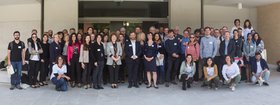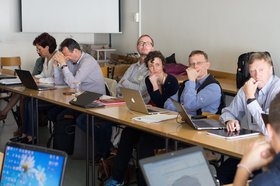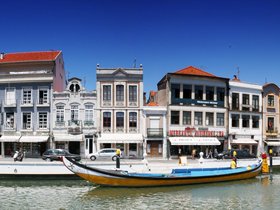3rd International EU COST-OceanGov Symposium (Ocean Governance for Sustainability: Challenges, Options and the Role of Science)
The 3rd International Symposium of the EU COST Action Ocean Governance for Sustainability: Challenges, Options and the Role of Science (chaired by Prof. Dr. Anna-Katharina Hornidge, also PI for SPP EMERSA project, took place in Aveiro, Portugal. The two-day symposium, held between the 11th and 13th of June 2018, marked a mid-point of the COST Action network, and was hosted by Dr. Cristina Pita and her team at the University of Aveiro.
The symposium was attended by five thematic working groups of the network, and kicked off with two keynote addresses. The first was delivered by Dr. Telmo Jorge Alves de Carvalho (Portuguese Institute for Sea and Atmosphere), who spoke on Portugal´s new ocean governance model with a focus on developing state marine innovation laboratories. The next day was followed with a talk by Prof. Dr. Nilufer Oral (Istanbul Bilgi University, and Member of the UN International Law Commission), who shared on the challenges of establishing a global framework for conservation and sustainable use for oceanic Areas Beyond National Jurisdiction (ABNJ).
A special side-event was hosted by E. Gissi, A-K Hornidge (EMERSA), and M. Portman on their recent publication in Marine Policy entitled “Un-gendering the ocean: Why women matter in ocean governance for sustainability” The paper presentation and review discussion was followed by a lively debate among many of the symposium participants, particularly touching on the politics and practices of identity formation, knowledge production in the marine sciences, together with the interplay of differentiated forms of spatial and institutional access.
Meanwhile, discussions within the several crosscutting working group - particularly Working Group 1 (Land-Sea Interactions), was dedicated to establishing roles and the interest in co-authoring journal articles. Rapti Siriwardane (EMERSA postdoc/scientific co-ordinator, WP II) will be leading a publication entitled "Bridging the marine-terrestrial divide: Epistemic translations along the coast", also drawing from the SPP 1889-funded EMERSA project insights derived from the Philippines and Indonesia within the context of riverine/freshwater and seashore/saltwater dyking. The joint publication - together with Henryk Alff, Paul Lawlor and a number of other members from crosscutting working groups - aims at identifying and tracing a number of terrestrialising mindsets or paradigms within the context of coastal management. Moreover, the conceptual paper will critically interrogate what the inherent ambiguities and blindspots land-based approaches in planning mean and what some of their consequences are when applied to coastal and marine spatialities. The paper will draw upon several thematic case studies. Apart from the design of shoreline defense mechanisms, the authors also intend on exploring knowledge flows/'translations' within the following contexts: spatial planning, disaster risk reduction practices (particularly urban flooding), and differentiated tenurial systems of reclaimed offshore land as opposed to coastal/grounded space.
For more on EU COST Action - Ocean Governance for Sustainability 3rd International Symposium - click here.



